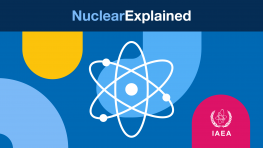Nuclear technologies are helping countries around the world achieve development objectives, including many of the UN Sustainable Development Goals. For instance, nuclear supports the zero hunger goal by facilitating the development of improved plant varieties: plants with higher yields and increased tolerance to the effects of climate change. In this episode, the benefits of mutation breeding, which uses irradiation to accelerate the natural process of spontaneous genetic variation, is explained.
Guests:
- Hugo Campos, Deputy Director General for Research and Development at the International Potato Center, Peru
- Lydia Horn, Plant Breeder and Coordinator of the Zero-Emission Research Initiative, University of Namibia
- Shoba Sivasankar, Head of Plant Breeding and Genetics at the IAEA
The experts explain the difference between mutation breeding and genetically modified organisms (GMOs) and how more resilient and productive crop varieties are developed with the help of irradiation.








